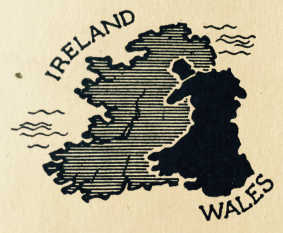Cwtsh-ing[1] Ireland: Relations between the Welsh Nationalist Party & Fianna Fáil, 1932-1948
This week, Syd Morgan (Swansea University) highlights the influence of Irish nationalism in the formation of a nationalist party in Wales.
In October 1948, “one of the greatest men in Europe today” (Éamon de Valera) met “the greatest Welsh leader of his generation” (Saunders Lewis) at a Plaid Cymru luncheon in Cardiff’s prestigious Park Hotel. The former Taoiseach was in Wales as part of the Great Britain leg of his global anti-partition campaign. During four days of activity by the high-powered Fianna Fáil delegation in Cardiff and Newport, Plaid Cymru played a prominent rôle. Its president, Gwynfor Evans (his words above), addressed anti-partition events chaired by Mr. John Fogarty of Cardiff, a member of both parties. For Welsh nationalists, this was “a great honour. It will give us attention; it will be a privilege”. Evans used the occasion to appeal to the Irish in Wales to “sympathise with and support Welsh nationalism”.
Dewi Prys Thomas’ graphic, from Dr. Noëlle Davies’ ‘Connolly of Ireland: Patriot & Socialist’ (Plaid Cymru, 1946)
Yet, although this Irish anti-partition campaign ended in complete failure[2] and the impact of de Valera’s mission on the votes of the Irish diaspora was, at best, marginal, October 1948 marked the apogee of a decades-old relationship. Delgado[3] has written that “the formal bilateral relationships between nationalist parties” is a research field “less examined”. In the absence of formal structures, contacts and visits, they often rely on individual mediators. These may or may not be influential and may have a specific agenda. In the case of ‘parties against states’, they have to overcome misleading information about the other. Helpful in building political contacts are cultural ties; in this case, the contested area of Celticism. This writer would add the importance of geography in the example of Ireland and Wales.
The influence of Irish nationalism on the formation of a separate, state-forming Welsh nationalist party is attested in the standard historical works and the personal reminiscences of party founders. However, research to date reveals a much broader synchronicity that is little explored. A number of shared policies have emerged. Perhaps obviously, constitutional development is to the fore. After the formation of the Irish Free State, de Valera’s gradual decoupling of his country from Crown and Empire, and its reorientation towards Europe and the League of Nations resonated across the Irish Sea. The construction of an economic nationalism, particularly the potential of co-operatives, was a shared value in opposition to Imperial links and over-dependence on finance capital. Contra the UK state, Welsh nationalists took the side of Éire in the 1932-1938 Anglo-Irish Trade War, in support of their own coal and shipping industries.
The field of international relations powerfully demonstrates the ideological and moral desire of the Welsh Nationalist Party to break with the UK state, using Éire as its principal exemplar. It shared Fianna Fáil’s anti-imperialism, supporting other nationalist movements across the Empire. Both strongly supported an effective League of Nations in which “small nations” had their fair share of influence against the Great Powers. More significantly for their national and electoral interests, both parties practised “positive neutrality” before and during the Second World War.
Fianna Fáil and the Welsh Nationalist Party were founded in 1926. By 1932, Fianna Fáil was the governing party in the Irish Free State – until 1948. In this period, the sub-state Welsh Nationalist Party secured no parliamentary seats, although it gradually increased its Westminster votes, and was moderately well-represented in local government. This asymmetric power relationship will be explored in depth. The research objective is an original appraisal of the transnational transmission of political values between two political parties.
In the field of the ‘four nations’ history of the British Isles, this work is, perhaps, an outlier. Its players are the majority party in a recently independent state dealing, inter alia, with national partition; and a minor sub-state party developing an ideology contrary to its state. Both parties share(d) unrequited state-building ambitions within the archipelago, a theme not irrelevant today.
[1] A “cwtsh” is a Welsh-language word for a close hug, commonly used by English-speakers in Wales and beyond
[2] Stephen Kelly, “A Policy of Futility: Éamon de Valera’s Anti-Partition Campaign, 1948-1951”, Études irlandaises, 36-2 | 201, 12pp.
[3] Ander Delgado, “Building Bridges? The Welsh and Basque Nationalist Parties during the Spanish Civil War”, International Journal of Regional & Local History, Vol.9 No.1, May 2014, 63-78.
Syd Morgan is a research officer in the European Institute of Identities at Swansea University. A former political practitioner and late ‘early-researcher’, he is a part-time PhD candidate studying the relationship between the two parties.
